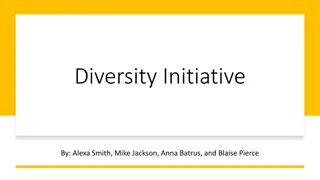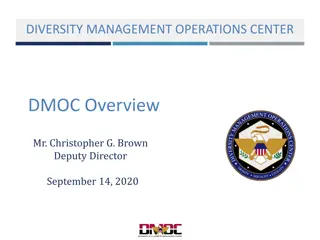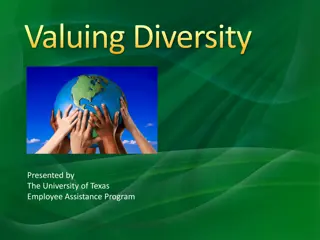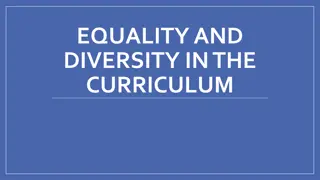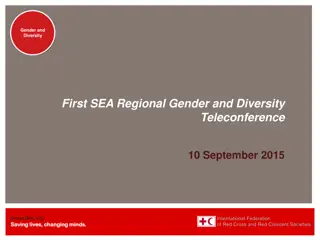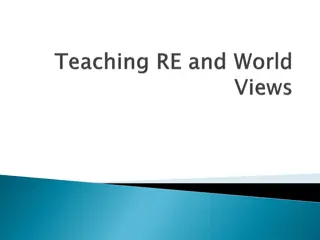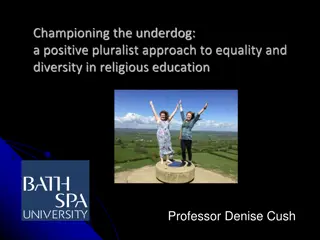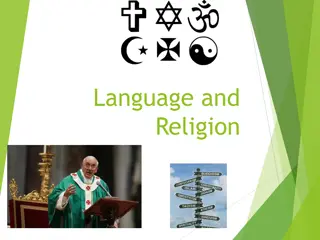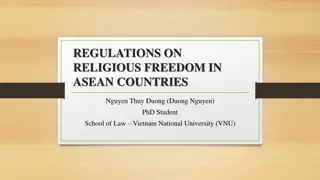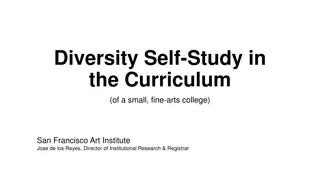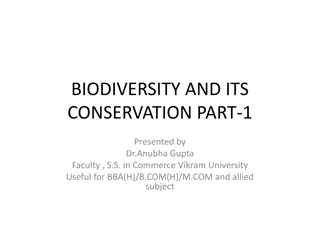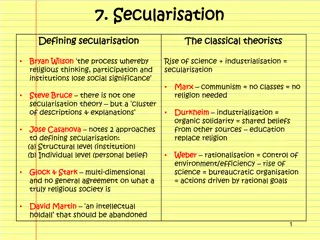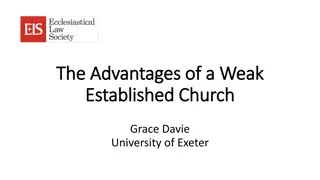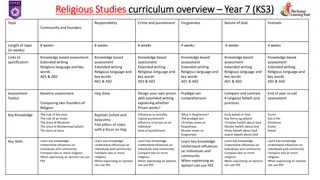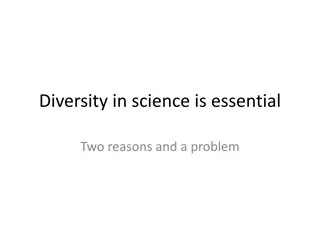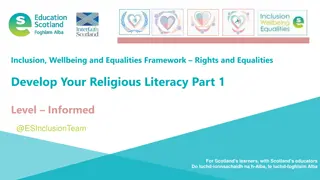Understanding Interfaith Harmony in Islamic Education
The third meeting conducted by the Islamic Education Faculty covered topics such as classroom regulations, tolerance among different religions, the concept of harmony among religious communities, and general challenges related to diversity in religious interpretations. The importance of maintaining
2 views • 13 slides
Understanding Supplier Diversity: Grange Enterprise Program
Supplier Diversity is a proactive program at Grange Enterprise that encourages minority-owned businesses to participate in sourcing. This initiative, managed by Enterprise Strategic Sourcing, aims to promote diverse suppliers such as Black, Hispanic, women, veterans, LGBT, and non-Caucasian male-own
1 views • 6 slides
Status of Family Laws in India: Hindu vs. Religious Minorities
The family and personal status laws in India vary between Hindu law and those pertaining to religious minorities. While Hindu law has seen extensive reforms, discriminatory provisions still exist. In contrast, laws governing religious minorities have undergone fewer reforms, leading to greater inequ
2 views • 4 slides
Promoting Diversity and Leadership Development Initiatives in Higher Education
This collection showcases various initiatives and programs aimed at promoting diversity, recruitment, and leadership development in higher education institutions. It includes images and descriptions of initiatives such as the Diversity Initiative, Applicants Diversity Recruiter, Sheetz Fellows Progr
4 views • 26 slides
NAYGN Local Chapter Lead Meeting Highlights and Initiatives
The NAYGN Local Chapter recently held a meeting led by Matthew Mairinger, COO of NAYGN Canada. The meeting covered various topics such as metrics, diversity & inclusion initiatives, professional development, book club, and staying active during COVID-19. The organization has launched a Diversity and
1 views • 18 slides
Understanding Religious Conflict: Definition and Types Explored
Religious conflict is a complex and recurring concept throughout history. Scholars have defined it as disagreements between religious groups. This conflict arises from contentious issues touching on ideology, morality, power, and identity, influenced by various socio-political, economic, and cultura
1 views • 13 slides
Overview of Religious Studies Course at Ramsey Grammar School
The Religious Studies course at Ramsey Grammar School for Year 9 students covers topics such as Christianity, Islam, Life and Death, Good and Evil, beliefs, practices, and church diversity. Students will be assessed through a written examination at the end of Year 11, with no coursework requirement.
0 views • 23 slides
Evolution of Akbar's Religious Policy: A Historical Overview
In the 16th century, Akbar the Great implemented a revolutionary religious policy in the Mughal Empire. Initially a devout Sunni Muslim, Akbar evolved his stance to promote harmony and equality among all religions, fostering tolerance and understanding. This shift marked a significant departure from
1 views • 25 slides
DIVERSITY MANAGEMENT OPERATIONS CENTER Overview
The Diversity Management Operations Center (DMOC) is committed to achieving DoD mission success through promoting a culture of inclusion and diversity. Led by Deputy Director Mr. Christopher G. Brown, the DMOC executes diversity management programs, focuses on EEO investigations and resolutions, con
2 views • 11 slides
Way Forward on Transparent Tx Diversity in 3GPP.TSG-RAN.WG4#94-e-Bis Meeting R4-2005652
The meeting discusses the implementation of transparent Tx Diversity for uplink full power transmission in the context of 3GPP specifications for FR1 in Release 16 and beyond. It outlines the necessary changes needed to allow UE behavior of transparent Tx Diversity, test case adaptations, power scal
1 views • 11 slides
Elizabethan Religious Settlement: Unity Amidst Division
Amid religious division in England, Queen Elizabeth I implemented a Religious Settlement in 1559 to unify the country. The settlement, a blend of Protestant and Catholic elements, aimed to maintain peace and prevent rebellions. Elizabeth's strategic compromise pleased most people, though lingering t
0 views • 14 slides
Understanding Secularism: Principles and Advantages
Secularism is the principle of separating government institutions from religious entities to ensure equal rights for believers and non-believers. It safeguards freedom of religious belief and practice, upholds religious freedom, and promotes democracy and fairness. Secularism aims to prevent religio
0 views • 21 slides
Unlocking the Power of Diversity in the Workplace
Discover the significance of valuing diversity in the workplace through the University of Texas Employee Assistance Program's insightful presentation. Learn about the impact of diversity, its benefits, and strategies to leverage differences for improved teamwork, productivity, and overall results. E
0 views • 28 slides
Understanding Religious Language: Cognitivism vs. Non-Cognitivism in the University Debate
This discussion explores the debate between cognitivism and non-cognitivism in religious language. Cognitivism asserts that religious claims aim to describe the world and can be true or false, while non-cognitivism argues that such claims express attitudes and cannot be verified. Flew's challenge qu
0 views • 9 slides
Promoting Equality and Diversity in the Curriculum
In the pursuit of an inclusive curriculum that values diversity, this resource explores the principles and practices of embedding equality and diversity in education. It delves into the importance of recognizing and promoting diversity in sources of knowledge, ensuring relevance and engagement, fost
0 views • 9 slides
Guide to Using the BSA Calendar of Religious Observances
The BSA Calendar of Religious Observances is a valuable resource for scheduling scouting events in consideration of various religious holidays and observances. This guide provides an overview of the calendar, highlights important dates, and emphasizes the importance of respecting religious diversity
0 views • 8 slides
Regional Gender and Diversity Network Initiatives in Southeast Asia
The Southeast Asia Regional Gender and Diversity Network focuses on promoting gender and diversity initiatives within National Societies. The network conducts teleconferences, annual meetings, and capacity-building sessions to enhance collaboration and strategic direction. Through the endorsement of
0 views • 11 slides
Exploring the Significance of Religious Education in Cultivating Understanding and Empathy
This content delves into how religious education prompts challenging questions about life's meaning, fosters personal reflection, and encourages empathy and respect for diverse beliefs. It aims to help children explore different religions, develop a sense of identity, and understand the impact of re
0 views • 46 slides
Positive Pluralism in Religious Education: Embracing Diversity and Equality
This collection of reflections delves into Professor Denise Cush's exploration of Positive Pluralism in the realm of religious education. The approach emphasizes inclusivity, equality, and diversity, urging a shift towards a more open and accepting educational environment. Through various manifestos
0 views • 36 slides
Understanding the Role of Language in Religion
Exploring the significance of language in religious contexts, this content discusses the functions, features, lexicon, grammar, and metaphorical aspects present in religious language. It delves into how religious language upholds spiritual beliefs, persuades believers, and expresses specific attitud
0 views • 8 slides
Regulations on Religious Freedom in ASEAN Countries
Religious freedom in ASEAN countries is explored, covering religious diversity, domestic laws, and regional/international obligations. The main religions in ASEAN are Islam, Buddhism, and Christianity. Various countries ensure the freedom to practice religions, with provisions to protect public safe
0 views • 12 slides
Understanding the Cultural Dimensions of Food and Religious Influences in Culinary Arts
Explore the impact of religious beliefs on food traditions and dietary restrictions across different cultures in the culinary world. Learn about the influence of major world religions on eating habits, food choices, and culinary practices. Discover how various religious groups, such as Christians, o
0 views • 26 slides
The Vital Role of Religious Institutions in Supporting Immigrants
Religions and immigration are interlinked in modern societies, where religions play a significant role in providing services, defending rights, and supporting the social cohesion of immigrants. Mainstream religious institutions serve as key actors in offering assistance, advocating for migrant right
2 views • 14 slides
Understanding Religious Language: Flew, Hare, Mitchell
Exploring the contrasting views of cognitivism and non-cognitivism in the context of religious language through the perspectives of Flew, Hare, and Mitchell. Delve into Flew's challenge on the undetectable gardener, Hare's concept of bliks, and Mitchell's response to the rationality of religious bel
0 views • 7 slides
Diversity Self-Study in the Curriculum of a Small Fine Arts College
San Francisco Art Institute conducted a diversity self-study in 2015-16 to address concerns about diversity and inclusivity in the curriculum. The study aimed to align with the college's Diversity Statement and Institutional Learning Outcomes, utilize assessment tools, and promote diversity, equity,
0 views • 35 slides
Religious Accommodation in the Army: Advising Command
The content discusses the role of the Chaplain Corps in advising Soldiers and leaders on religious accommodation in the Army as of February 13, 2019. It covers learning objectives, legal foundations, Army policies, procedures, recent changes, and references related to religious accommodation. The in
0 views • 36 slides
Building Diversity in PRSSA Chapters: A Comprehensive Approach
This content showcases how a PRSSA chapter focused on diversity and inclusion by adding a Diversity and Inclusion Director to their eboard, recruiting students from various schools, engaging with high school students, collaborating with PR firms, and partnering with the school's diversity and inclus
0 views • 12 slides
Understanding Biodiversity and Conservation
Biodiversity refers to the variety of living organisms and ecosystems. It includes genetic diversity, species diversity, and ecosystem diversity. Genetic diversity plays a crucial role in adaptation and evolution, while species diversity reflects the richness of different species in a region. Conser
2 views • 11 slides
Understanding Religious Discrimination Laws in California Workplace
Learn about the regulations and protections under FEHA and Title VII in California, including religious exemptions, accommodation requirements, case studies, and best practices to address discrimination issues effectively. Discover the statistical insights on religious discrimination complaints and
0 views • 45 slides
Understanding Secularisation: The Decline of Religious Influence in Society
Secularisation refers to the process in which religious thinking, participation, and institutions lose their social significance. This phenomenon is influenced by factors such as the rise of science, industrialisation, changing social attitudes, and the disengagement of the church from society. Evid
0 views • 8 slides
Philosophers' Views on Religious Experience: Insights and Critiques
This lesson delves into the perspectives of various philosophers such as Rudolph Otto, Richard Swinburne, John Hick, and Michael Persinger on religious experiences. It explores concepts like the numinous, religious knowledge, God's existence, and criticisms on the validity of religious experiences.
0 views • 7 slides
Philosophers' Views on Religious Experience: Insights from William James
Explore William James' perspective on religious experiences, including his views on existential and value judgments. Understand how James argued for the validity of religious experiences and their potential proof of God's existence. Delve into the implications of emotions and prior beliefs on interp
0 views • 7 slides
Religious and Social Conflicts Fueling the Rise of Absolutism in Europe
Social, economic, and religious conflicts in Europe played a significant role in the emergence of absolutism where monarchs wielded supreme power without sharing it with legislative bodies. Events like Spain's religious conflicts, Protestantism in England, the Spanish Armada, religious conflict in t
0 views • 10 slides
Religious Pluralism and Civil Society: A Paradox in Government Control
Understanding the intricacies of religious pluralism in the context of government control reveals a paradox where restricting religion can hinder social cohesion and economic growth. Through insights on the counterproductivity of control, the role of religious organizations in civil society, and the
0 views • 16 slides
US Religious Freedom Restoration Act (RFRA) Overview
The US Religious Freedom Restoration Act (RFRA) aims to protect the free exercise of religion by ensuring that governments do not substantially burden religious practices without compelling justification. It emphasizes striking a balance between religious liberty and governmental interests through t
0 views • 9 slides
Reflections on Religion in Europe: Long-term Perspectives and Contemporary Challenges
Several decades of research on religion in Europe have revealed a distinctive pattern that highlights both the presence and absence of religious influences. The context of cultural institutions, historic churches, shifting societal norms, and increasing diversity poses both opportunities and challen
0 views • 26 slides
Religious Studies Curriculum Overview for Year 7 and 8 (KS3)
Explore various topics such as responsibility, crime and punishment, forgiveness, nature of God, festivals, community, founders, worship, creation, life after death, rules and laws, relationships in this detailed Year 7 and 8 (KS3) Religious Studies curriculum. The curriculum includes assessments, e
0 views • 6 slides
Embracing Diversity in Science: Opportunities and Challenges
Diversity is crucial in science for varied perspectives, interpretations, and tools leading to breakthroughs. Future scientists must be drawn from a diverse talent pool. However, there's a problem in underutilizing diverse talent in the scientific workforce. Initiatives like Purdue University's stra
0 views • 23 slides
Developing Religious Literacy for Educators in Scotland
This resource aims to enhance educators' understanding of religious literacy by exploring religious discrimination, core beliefs of major faiths, and additional learning sources. It encourages educators to consider the needs of learners in relation to their religious beliefs in Scotland.
0 views • 30 slides
Settling the Northern Colonies: Religious Transformation and Colonization
The Protestant Reformation led to the emergence of Puritanism in the Northern Colonies, with figures like Martin Luther and John Calvin shaping religious beliefs. The Massachusetts Bay Colony stood as a beacon of self-government and religious ideals, while dissenters like Anne Hutchinson and Roger W
0 views • 9 slides



